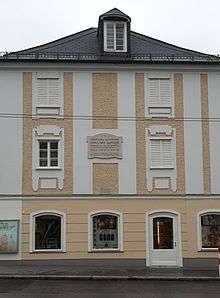Christian Doppler
| Christian Doppler | |
|---|---|
 | |
| Born |
29 November 1803 Salzburg, Austrian Monarchy |
| Died |
17 March 1853 (aged 49) Venice, Kingdom of Lombardy–Venetia |
| Nationality | Austrian |
| Institutions |
Prague Polytechnic Academy of Mines and Forests University of Vienna |
| Alma mater |
Imperial–Royal Polytechnic Institute Prague Polytechnic |
| Notable students | Gregor Mendel |
| Known for | Doppler effect |
Christian Andreas Doppler (/ˈdɒplər/; German: [ˈdɔplɐ]; 29 November 1803 – 17 March 1853) was an Austrian mathematician and physicist. He is celebrated for his principle — known as the Doppler effect — that the observed frequency of a wave depends on the relative speed of the source and the observer. He used this concept to explain the color of binary stars.
Biography
Christian Doppler was born in Salzburg in Austria in 1803. After completing high school, Doppler studied philosophy in Salzburg and mathematics and physics at the Imperial–Royal Polytechnic Institute (now Vienna University of Technology) where he began work as an assistant in 1829. In 1835 he began work at the Prague Polytechnic (now Czech Technical University), where he received an appointment in 1841.

Only a year later, at the age of 38, Doppler gave a lecture to the Royal Bohemian Society of Sciences and subsequently published his most notable work, "Über das farbige Licht der Doppelsterne und einiger anderer Gestirne des Himmels" (On the coloured light of the binary stars and some other stars of the heavens). There is a facsimile edition with an English translation by Alec Eden.[2] In this work, Doppler postulated his principle (later coined the Doppler effect) that the observed frequency of a wave depends on the relative speed of the source and the observer, and he tried to use this concept for explaining the colour of binary stars. While he worked at the Prague Polytechnic as a professor he published over 50 articles on mathematics, physics and astronomy.
In 1847 he left Prague for the professorship of mathematics, physics, and mechanics at the Academy of Mines and Forests (its successor is the present day University of Miskolc) in Selmecbánya (then Kingdom of Hungary, now Banská Štiavnica, Slovakia),[3][4] and in 1849 he moved to Vienna.[5]
Doppler's research was interrupted by the revolutionary incidents of 1848. During the Hungarian Revolution, he fled to Vienna. There he was appointed head of the Institute for Experimental Physics at the University of Vienna in 1850. During his time there, Doppler, along with Franz Unger, played an influential role in the development of young Gregor Mendel, known as the founding father of genetics, who was a student at the University of Vienna from 1851 to 1853.[6]
Doppler died on 17 March 1853 at age 49 from a pulmonary disease in Venice (at that time part of the Austrian Empire). His tomb, found by Dr. Peter M. Schuster[7] is just inside the entrance of the Venetian island cemetery of San Michele.[8]
Full name
Some confusion exists about Doppler's full name. Doppler referred to himself as Christian Doppler. The records of his birth and baptism stated Christian Andreas Doppler. Forty years after Doppler's death the misnomer Johann Christian Doppler was introduced by the astronomer Julius Scheiner. Scheiner's mistake has since been copied by many.[2]
Works
- Christian Doppler (1803–1853). Wien: Böhlau, 1992.
- Bd. 1: ISBN 3-205-05483-0
- 1. Teil: Helmuth Grössing (unter Mitarbeit von B. Reischl): Wissenschaft, Leben, Umwelt, Gesellschaft;
- 2. Teil: Karl Kadletz (unter Mitarbeit von Peter Schuster und Ildikó Cazan-Simányi) Quellenanhang.
- Bd. 2: ISBN 3-205-05508-X
- 3. Teil: Peter Schuster: Das Werk.
- Bd. 1: ISBN 3-205-05483-0
See also
References
- ↑ http://www.visit-salzburg.net/sights/christiandoppler.htm
- 1 2 Eden, Alec (1992). The search for Christian Doppler. Wien: Springer-Verlag. ISBN 0-387-82367-0
- ↑ http://www.ombkenet.hu/bkl/banyaszat/2003/bklbanyaszat2003_5_07.pdf
- ↑ "Archived copy". Archived from the original on 4 October 2013. Retrieved 2013-02-18.
- ↑ http://www.whonamedit.com/doctor.cfm/3039.html
- ↑ "The Mathematics of Inheritance". Online museum exhibition. The Masaryk University Mendel Museum. Archived from the original on 31 January 2013. Retrieved 20 January 2010.
- ↑ Schuster, Peter M. (2005). Moving the Stars — Christian Doppler: His Life, His Works and Principle, and the World After. Pöllauberg, Austria: Living Edition. ISBN 3-901585-05-2 (translated by Lily Wilmes; Webpage of the author)
- ↑ Štoll, Ivan (1992). "Christian Doppler — Man, Work and Message". The Phenomenon of Doppler. Prague: The Czech National University. p. 28.
Further reading
- Alec Eden: Christian Doppler: Leben und Werk. Salzburg: Landespressebureau, 1988. ISBN 3-85015-069-0
- Hoffmann, Robert (2007). The Life of an (almost) Unknown Person. Christian Doppler’s Youth in Salzburg and Vienna. In: Ewald Hiebl, Maurizio Musso (Eds.), Christian Doppler – Life and Work. Principle an Applications. Proceedings of the Commemorative Symposia in Salzburg, Salzburg, Prague, Vienna, Venice. Pöllauberg/Austria, Hainault/UK, Atascadero/US, pages 33 – 46.
External links
- Christian Doppler at Find a Grave

Wikiquote has quotations related to: Christian Doppler
| Wikimedia Commons has media related to Christian Doppler. |
- O'Connor, John J.; Robertson, Edmund F., "Christian Doppler", MacTutor History of Mathematics archive, University of St Andrews.
